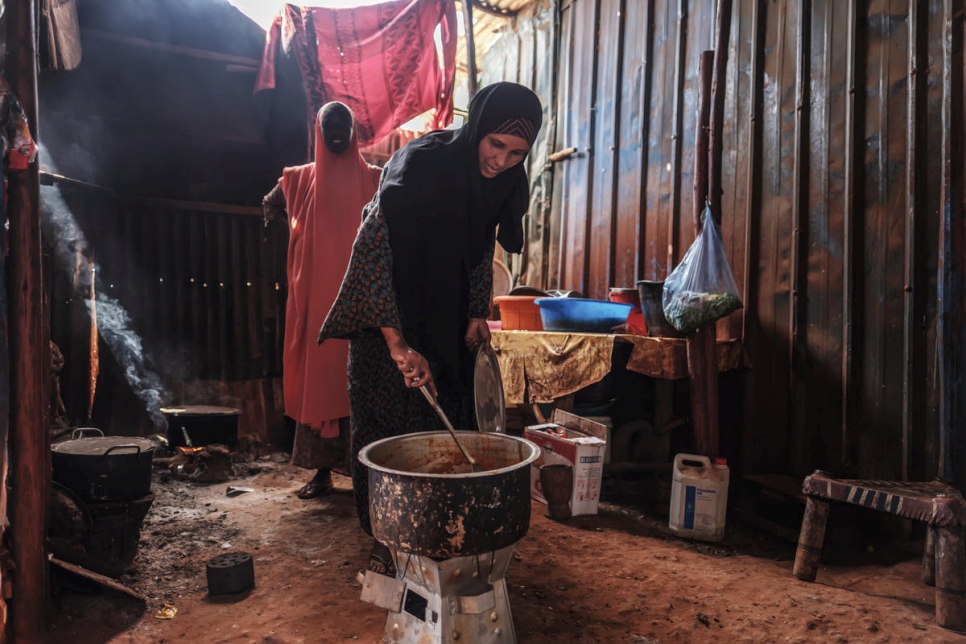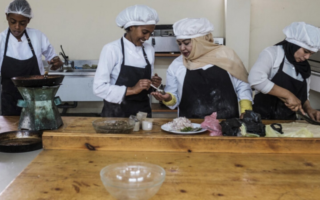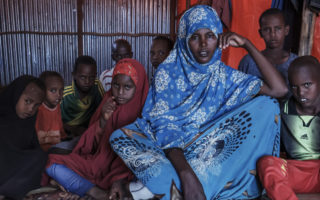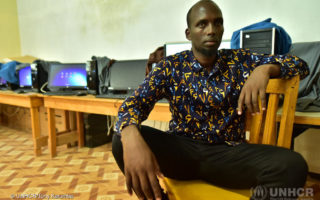
Somali refugee Asha Abdikadir Ahmed, 42, cooks on a charcoal burner in her restaurant in Bur Amino, Ethiopia. © UNHCR/Eduardo Soteras Jalil
A cooperative of Somali refugees and Ethiopian host community, supported by the IKEA Foundation, turn invasive weeds into energy.
By Katie Nguyen in Bur Amino, Ethiopia
When Asha Abdikadir Ahmed used to cook with firewood, her restaurant filled with billowing clouds of smoke. But now, when she tosses a charcoal briquette onto the fire, it burns clean and lasts all morning.
“This charcoal is better than the firewood I was using before. It is cheaper and more efficient,” says Asha, 42, who has been running her own restaurant in Bur Amino camp for Somali refugees in southern Ethiopia since it opened in 2011.
Ladling sauce on to a nest of spaghetti for a customer, Asha explains that, instead of paying 150 Ethiopian birr (about US$5) a day for a bundle of wood to use as fuel, two briquettes costing five birr each (US$0.20) can see her through the day.
For the past few months, Asha has been buying charcoal briquettes from a cooperative of more than 70 Somali refugees and local Ethiopian women, which has been turning prosopis juliflora – a notoriously invasive, spiky tree – into a cleaner source of energy that brings a range of benefits to the economy and environment.
Native to South and Central America, prosopis was planted in Africa throughout the 20th century and was initially welcomed for providing charcoal for cooking, wood for homes and fencing for livestock, shade from the blistering sun, and a defence against soil erosion.
But growing up to 15 metres in height, it has gained a fearsome reputation for taking over arable grazing land, threatening the livelihoods of farmers and herders. Animals get sick or die from eating its pods and can be pierced by its long, sharp thorns, while the tree’s deep roots suck up water in already thirsty areas.
“Where there is a prosopis tree, there can’t be anything else. It will take up all the water and make the land dry.”
“The disadvantages are too many. Where there is a prosopis tree, there can’t be anything else. It will take up all the water and make the land dry,” says Moge Abdi Omar, the project coordinator of Women and Pastoralist Youth Organization, Wa-PYDO, which set up the cooperative in 2017 with support from the IKEA Foundation.
The Bur Amino cooperative buys prosopis from another cooperative which cuts down the tree in Dollo Ado on the border with Somalia. Together, the women strip the bark from the tree to make slow-burning, smokeless charcoal briquettes to sell to clients like Asha. The leftovers are sold as firewood for cooking.
Ethiopia hosts more than 700,000 refugees. Meeting the energy needs of refugees in Bur Amino camp and elsewhere continues to be a major challenge.
At least four out of five forcibly displaced people around the world rely on wood for cooking and heating. Not only does this drive deforestation and environmental degradation, but it can also inflame tensions between refugees and host communities that also depend on wood as a source of fuel.
In addition, increasing deforestation often forces refugee women and girls to walk farther and farther to find firewood, exposing them to the risk of being raped or beaten while travelling for long hours alone.
“Before, we used to walk seven or eight kilometres in the bush. There were more dangers then,” said 26-year-old Saredo Abdi, who is a member of the Bur Amino cooperative.
“Before, we used to walk seven or eight kilometres in the bush. There were more dangers then,”
In addition to providing a cleaner fuel, Moge says the project has three clear benefits.
“Since we’re working on livelihoods, the refugees may get income and job opportunities. Secondly, it may solve the problem they have with the host community and thirdly, it helps address protection issues like gender-based violence,” adds Moge.
The support that the cooperative has received from the IKEA Foundation illustrates how a wider approach to address refugee situations can result in greater refugee self-reliance and support to host communities.
Such examples of strategic partnerships and solidarity will be showcased at the Global Refugee Forum – a high-level meeting opening next week in Geneva. The forum will bring together governments, international organizations, local authorities, civil society, the private sector, host community members and refugees themselves to discuss the best policies to protect refugees, and help them and their hosts to thrive and find lasting solutions.
More than 20 kilometres away in Dollo Ado, the prosopois harvesting cooperative are hard at work, hacking away at the trees which have transformed this dry, dusty area into a prickly green forest. Donkeys bray as a line of camels are carefully led through the thicket.
The men throw the logs of the invasive tree onto a pile. Each piece can fetch between 5 birr (US$0.20) and 20 birr (US$0.70).
Resting his axe on his shoulder, Aden Abdullahi Ahmed, a member of the Dollo Ado cooperative says he hopes his work will benefit future generations of host communities and refugees alike. His cooperative started with 10 members representing both refugees and their Ethiopian hosts and now there are 40.
“Cutting down the prosopis will be very useful for energy,” says the 30-year-old. “At the same time, you are eradicating it and clearing the bush. Maybe farmers will benefit from the empty land.”
Originally published on UNHCR on 13 December 2019





